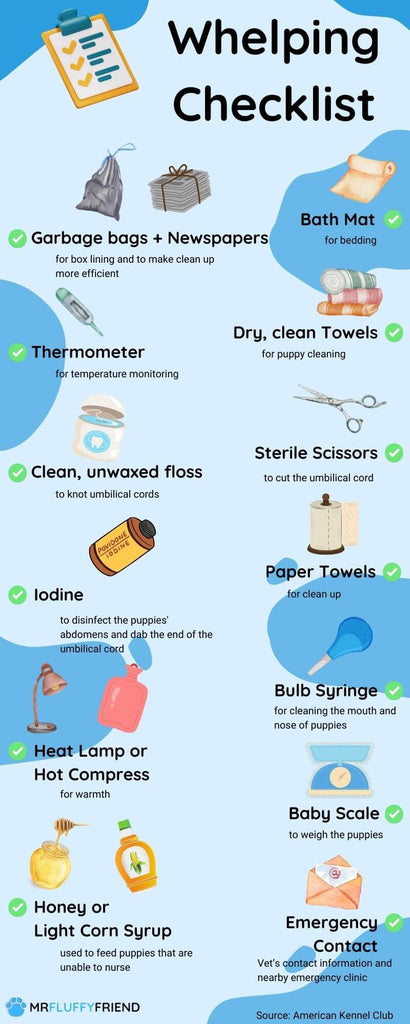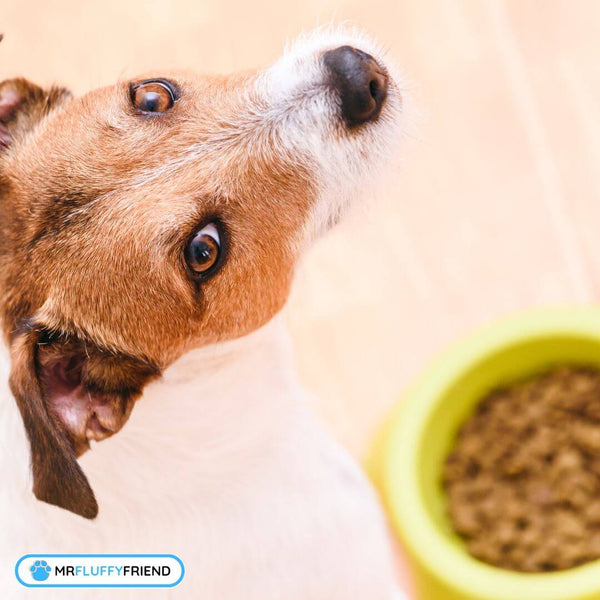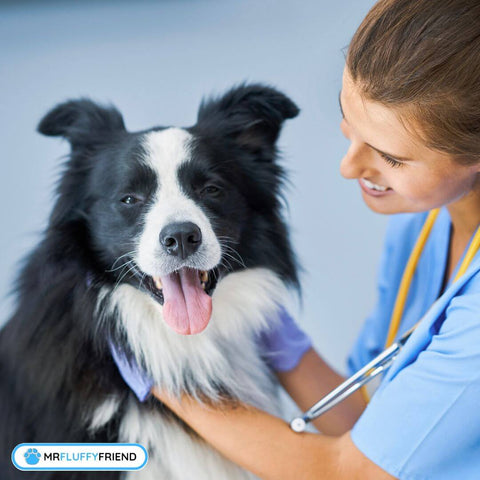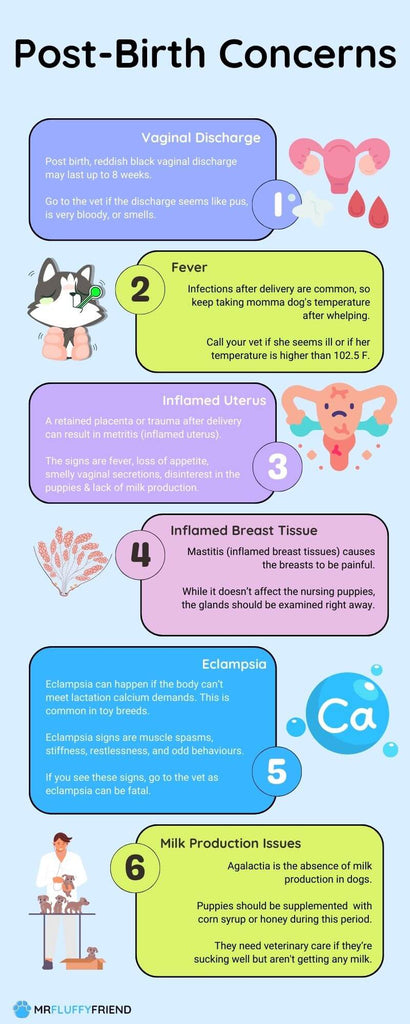Pregnant Dog Care Tips
Bringing a new life into the world is always an exciting time.
When it comes to your Fluffy Friend, ensuring a smooth and healthy pregnancy is crucial.
In today’s blog post, we’ll take a look at some pregnant dog care tips that you need to know.
Taking good care of your pregnant dog involves understanding her specific needs.
This can range from creating a comfortable whelping box to monitoring her nutrition and health.
Click the links below to go to that section:
- What do you need to prepare?
- What should your pregnant doggie eat?
- How should you prepare for labour?

Preparation and Monitoring

Creating a Comfortable Whelping Box:
- Choosing the Right Spot:
One of the first steps in preparing for your dog's pregnancy is creating a whelping box.
Choose a quiet spot in your home where your female dog can feel safe and comfortable.
A cardboard box lined with a clean towel can serve as a cosy and secure space for the upcoming delivery.
- Size Matters:
Ensure the whelping box is appropriately sized for your dog.
It should be large enough for your dog mum to move around comfortably.
You need to also ensure that it’s small enough to provide a sense of security for the newborn puppies.
- Easy Access:
Make sure the whelping box has low sides for easy access.
Remember that your dog progresses through her pregnancy.
The low sides will help her enter and exit the box without straining herself.
Monitoring Your Dog’s Pregnancy:
- Signs of Pregnancy:
Recognising the signs of pregnancy is crucial.
The common signs include the following:
- Weight gain
- Changes in body temperature
- Enlarged mammary glands
- Mood swings
- Swollen belly
The best way to make sure is to go to the vet.
Dogs may look like they’re pregnant because of the signs but these may be false pregnancies.
Thus, it’s better to go to the vet so they can rule out any serious conditions.
- Ultrasound Scan:
Consider scheduling an ultrasound scan.
This will not only confirm the presence of unborn puppies but also estimate litter size.
- Blood Tests:
Blood tests can assess hormonal changes and provide information about your dog's overall health during pregnancy.
Ask your veterinarian what blood test is necessary for your pet.
Related: What Is A Manx Cat: Facts and Information
Proper Nutrition and Veterinary Care:
Nutrition and Dietary Considerations:

- Proper Diet:
Maintaining a proper diet is one of the most important aspects of caring for a pregnant dog.
Choose a high quality puppy food that meets her nutritional needs during this crucial time.
Ensure the food is easily digestible and provides essential nutrients.
Also, for large breeds, prepare an adjustable dog bowl so she wouldn’t have to stoop too low for her meals.
- Food Intake:
While pregnant, your dog will need more calories.
It’s a good idea to feed momma doggie frequent, small meals to prevent overeating and digestive issues.
Slowly increase food intake during the pregnancy.
Consider her specific needs and tailor fit her diet as necessary.
- Dietary Supplements:
Consider adding dietary supplements recommended by your veterinarian.
Much like humans, pregnant doggos need supplements to help with the development of the unborn puppies.
- Fresh Water:
Always provide fresh water for your pregnant dog.
Proper hydration is crucial for her well-being and the healthy development of the puppies.
Health Monitoring and Veterinary Care:

- Regular Veterinary Visits:
Regular veterinary check-ups are essential throughout your dog's pregnancy.
Your vet can monitor her overall health, address any concerns, and provide guidance on adjusting her care as needed.
- Signs of Illness:
Be vigilant for signs of illness.
Look out for any changes in appetite, lethargy, or abnormal vaginal discharge.
If you notice any unusual symptoms, contact your dog’s vet ASAP.
- Parasite Control:
Keep your dog free from intestinal parasites and fleas.
Discuss safe parasite control methods with your vet, as some products may not be suitable for pregnant dogs.
Related: How I Became a Better Dog Owner
Labour up to Post-Birth Preparations:

Preparing for Labour and Birth:
- Signs of Labour:
As your dog nears her due date, watch for signs of labour.
Just like humans, dogs go through a series of stages during labour.
Here are some common signs that indicate a dog is in labour:
- Drop in Body Temperature:
- A drop in the rectal temperature of somewhere below 100°F or 37.8°C may happen about 24 hours before labour begins.
- Restlessness and Nesting Behaviour:
- Your doggie might try to create a comfortable and safe space for giving birth.
- Lack of Appetite:
- Some dogs may lose interest in food a day or two before labour starts.
- Pacing and Panting:
- Pacing, panting, and excessive grooming are typical when your dog is about to give birth.
- Vomiting and Shivering:
- Some dogs may experience vomiting or shivering during the early stages of labour.
- Visible Contractions:
- As contractions begin, you may notice the dog's abdomen visibly contracting.
- Rupture of Membranes:
- The amniotic sac may rupture, causing a release of clear fluid.
- Straining and Efforts to Push:
- The dog will start actively pushing during contractions.
It's important to note that the duration of labour can vary among individual dogs.
Still, if you notice any of these, call your vet immediately:
- signs of distress
- prolonged straining but no puppy being delivered
- if there are more than two hours between puppies without progress
Always have a plan in case of complications.
If you suspect your dog is in labour or if you have concerns, get in touch with your vet.
- Quiet and Stress-Free Environment:
Create a quiet and stress-free environment for the birthing process.
Try to minimise disruptions, and provide a calm space for your dog to give birth comfortably.
- Appropriate Medication:
Consult your veterinarian about any necessary medications during labour.
Some dogs may require medical assistance to ensure a smooth delivery.
- The Birthing Process:
Be prepared for the birthing process, also known as whelping.
Have a clean towel to clean the new puppies.
Check if they're breathing properly.
Post-Birth Care:
- First Milk:
The first milk produced by the mother dog (colostrum) is rich in antibodies and essential for the puppies' immune system.
Each puppy should get a chance to nurse from their mother.
- High-Quality Puppy Formula:
As a precaution, have a high-quality puppy formula on hand.
This is just in case there are concerns about the mum’s milk production.
This ensures the new-borns receive the necessary nutrients for their growth.
- Watchful Eye:
Keep a watchful eye on both the mother and her puppies in the days following birth.
Look for signs of any health issues and ensure that the mother is recovering well.
Related: 10 Cat Breeds That Get Along With Dogs

Conclusion
Caring for a pregnant dog is a rewarding yet challenging responsibility.
With the right preparation, you can ensure a smooth and healthy pregnancy.
If it’s your first time being a grandparent to your doggies, you can always ask for help from your vet.
Looking for some products that could help you out?
Check out our Online Shop!
Here are some useful products in relation to this blog post:
MrFluffyFriend - Adjustable Dog Bowls
MrFluffyFriend - Hygienic Water Dispenser
